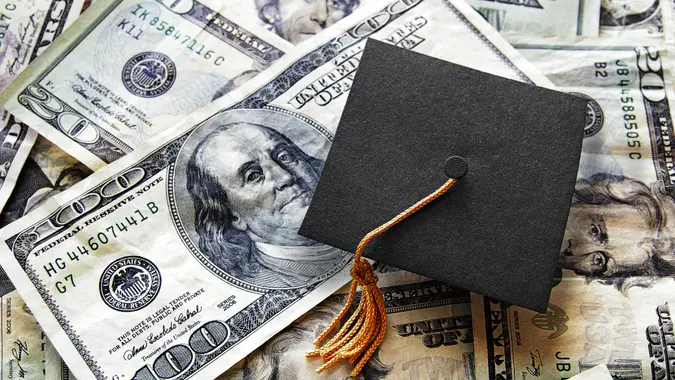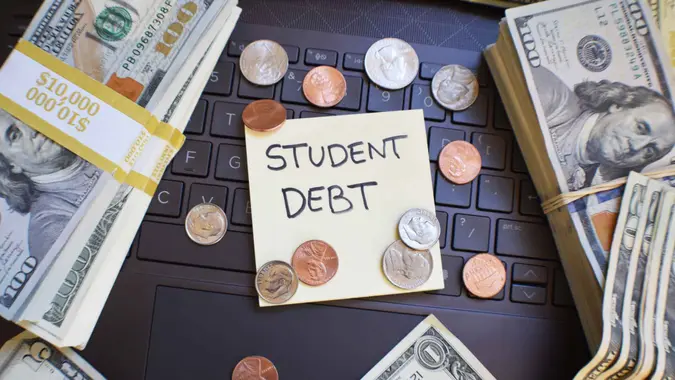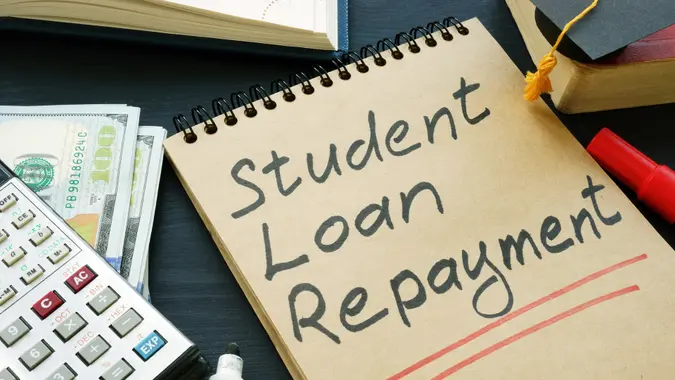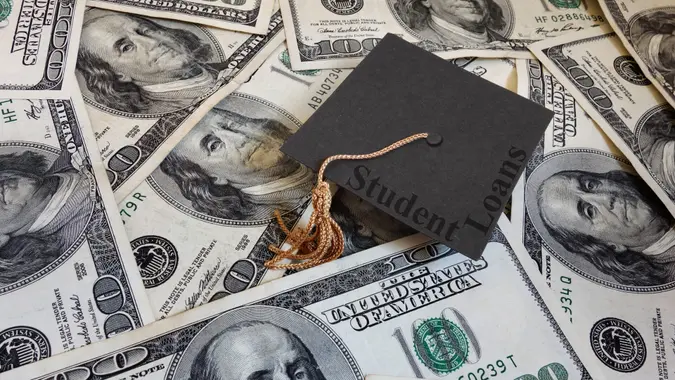Student Loan Borrowers Share 7 Tips and Shortcuts They Used To Pay Down Their Debt

Commitment to Our Readers
GOBankingRates' editorial team is committed to bringing you unbiased reviews and information. We use data-driven methodologies to evaluate financial products and services - our reviews and ratings are not influenced by advertisers. You can read more about our editorial guidelines and our products and services review methodology.

20 Years
Helping You Live Richer

Reviewed
by Experts

Trusted by
Millions of Readers
Student loans are often the only way a person can afford to attend college, given the high price tag for even the most modest of schools. Without family support or a big nest egg, loans offer a quick and easy approach to getting the education that hopefully sets you on the path to a good career.
Unfortunately, student loan interest rates are often quite high, and many people defer starting their payments for many years, leaving them paying a significant chunk of interest when they finally do. However, there may be some ways around the long, laborious payment process. We reached out to borrowers who explained some shortcuts and tips they used to pay down their student loans more quickly than average.
Use Proceeds of a Home Sale
Since not very many people are likely to come into a windfall of cash, one way some have paid off their student loans is by taking the proceeds from a home sale and paying the loans off in full.
Rebekah Gummow, a Washington resident, paid off the $23,000 remaining of her $30,000 in student loans for a bachelor’s degree in anthropology/sociology in 2014. “We were able to take a chunk of cash from the sale [of our home] and pay them off, because of housing cost differences at the time; houses in California were almost double what they were in Washington.”
Additionally, California resident Amy McElroy and her husband had about $100,000 in joint law school loans in the 1990s. After paying the minimum for their first few working years, they moved to California in 2000, bought a fixer-upper and remodeled it. “We pulled out shag green carpet in every room that reeked of smoke and waxy air fresheners, along with fake wood paneling that also held the smells. We painted the inside.”
They sold the house for a significant profit after nine months, bought a newer house on a quieter street nearby, and paid off all the student loans approximately five years after graduating law school.
Don’t Choose Interest-Only Loans
One thing that McElroy recommends is avoiding interest-only loans or deferring payment unless you absolutely have to.
“Even if you believe in prioritizing experiences, like travel or an extravagant wedding, be very cognizant about the trade-offs you will pay in interest on your loans. The freedom to enjoy those experiences after you have eliminated your debt will make these things even more enjoyable. But compounding the debt will create a burden that can seem endless.”
Refinance a Home
For people not in a position to sell a home, sometimes refinancing is a way to pull money out that can be applied to student loans instead. Robin Levin of California and her ex-husband took out loans to pay for his law school in 1986. In 1992, they refinanced their house and paid off the whole loan.
“If we had not done that we probably would have been paying on them for another 10 to 20 years,” she said.
The reason for doing this, she said, is that “interest on a home equity loan is considerably less than the interest you are paying on the educational loan.” She added, “The interest on an educational loan is typically 8.5% while a mortgage or home equity loan is about 5%. You can also stretch a mortgage out to 40 years if you are having trouble making the payment.”
Move in With Parents
When Heather Seggel completed her English degree in California, she wasn’t planning on moving in with her parents — but life had other plans.
“My shared rental situation fell through and I ended up moving back in with my parents, which was hard for all of us. However, they let me work and pay off the loan and didn’t charge me rent so I could prioritize getting out of debt. When I saw how little making the minimum was doing to actually pay off the loan it really freaked me out, and then I was hit with numerous $25 late fees when my payments weren’t late and alarms went off so I started throwing everything I made at it,” she said.
She paid off $13,000 in approximately three years. Without that financial windbreak, she suspects she would still be paying them, even for that small amount, because of the high interest rate.
Pay More Than the Minimum
Seggel urged, “If there is any way you can pay more than the minimum, try to do it. The total really will come down faster that way. Look at your budget (and if you don’t have one, make one–a bar napkin version will do), and keep prodding at where you might be able to bring in more money and where you can cut expenses to put more toward payment.”
Join the Military/Utilize the GI Bill
Daniella Mestyanek Young, a scholar, former U.S. Army captain and the author of “Uncultured: A Memoir,” was able to pay her student loans by joining the military. The Army paid off her $17,000 in loans that she acquired between 2006-2009 for a bachelor’s degree in literary studies.
While she made it clear that she doesn’t recommend joining the military just for the education benefits, she said, “If you are joining the military, educate yourself on all the education benefits. I met many a soldier who didn’t get their stuff paid off. Meanwhile, I have my bachelor’s, my master’s and maybe a future PhD paid through service benefits. Do the research and get all the facts before you sign.”
She joined the Army and chose student loan repayment, which actually meant giving up her GI bill benefits, unless she served an additional three years. “It was risky for only 17 grand, but since I thought I’d likely serve longer than three years, it made sense.”
Take Money out of Retirement Accounts
Cassie Parker, a petroleum scientist manager in Louisiana, took out $38,000 in loans in the 1990s for a bachelor’s degree in petroleum engineering. Even paying $100 over the minimum amount for 10 years wasn’t reducing the principal amount fast enough because it was mostly going to interest. “I pulled money out of my 401(k) in 2021 to finish paying them off.”
Without the bump from her retirement account, she expects it would have taken her 30 or more years to pay them off. Her tip is to “budget and pay as much you possibly can in the first five to 10 years…even if it means doing without a lot of stuff.”
More From GOBankingRates
 Written by
Written by  Edited by
Edited by 

























